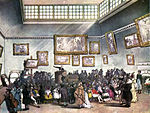Chinese auction
Chinese auction is a type of the all-pay auction, where the probability of winning depends on the relative size of a participant's bid.[1] The choice of the winner is done by a lottery, whereby the bidders compete for a higher chance of winning.[1]
It is also known as penny raffle, chance auction and tricky tray.[2][3]
Etymology[edit]
The origin of the name is unknown.[1] There is no connection to Chinese culture.[2] The term probably originated from the time of Chinese Exclusion Act as Chinese immigrants were paid low wages and the raffle tickets were inexpensive too.[2]
Significance[edit]
Chinese auctions are usually conducted during charity events for fundraising.[4] Political elections and patent races can be modeled as Chinese auctions, in which the chance of winning is seen as proportional to the amount spent.[5]
References[edit]
- ^ a b c Benegas, Mauricio (1 January 2015). "Bidding behavior in a symmetric Chinese auction". EconomiA. 16 (1): 93–110. doi:10.1016/j.econ.2015.03.003. hdl:10419/179589. ISSN 1517-7580. S2CID 154752695.
- ^ a b c "Opinion: With Certain Words, Watch Your Mouth". The New York Times. 12 March 2006. Retrieved 28 October 2023.
- ^ MCLENNAN, Andy (2018). "Efficient disposal equilibria of pseudomarkets" (PDF). Workshop on Game Theory: 8.
- ^ Heiss, Renee (2007). Helping Kids Help: Organizing Successful Charitable Projects. Chicago Review Press. ISBN 978-1-56976-211-0.
- ^ Shor, Mikhael. "Chinese Auction - Game Theory .net". www.gametheory.net. Retrieved 28 October 2023.

